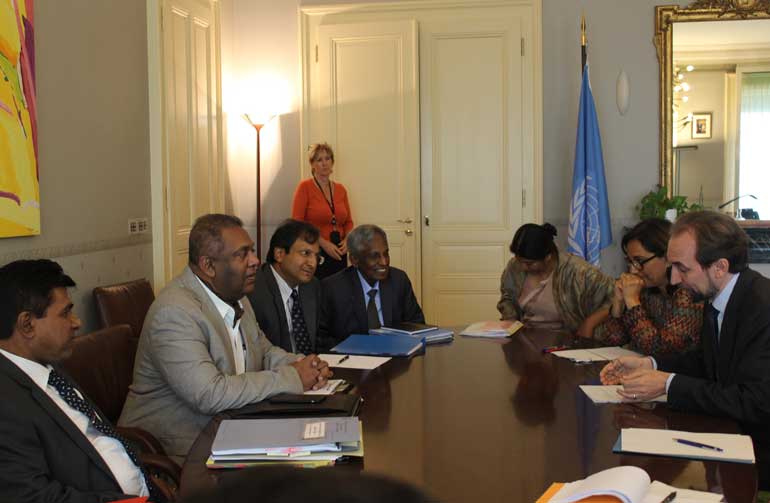Monday Feb 16, 2026
Monday Feb 16, 2026
Monday, 14 September 2015 00:00 - - {{hitsCtrl.values.hits}}
 Foreign Minister Mangala Samaraweera and Justice Minister Wijeyadasa Rajapakshe along with senior government officials during their meeting with UN High Commissioner for Human Rights Prince Zeid at the Palais Wilson in Geneva yesterday.
Foreign Minister Mangala Samaraweera and Justice Minister Wijeyadasa Rajapakshe along with senior government officials during their meeting with UN High Commissioner for Human Rights Prince Zeid at the Palais Wilson in Geneva yesterday.
By Dharisha Bastians
in Geneva
Foreign Minister Mangala Samaraweera will address the 30th Session of the UN Human Rights Council in Geneva today, after Government quarters remained tight-lipped over the weekend about the copy of a highly anticipated report on the UN investigation it officially received on Friday (11).
Both the UN and the Government have maintained a stony silence about the report that has now been seen by the Sri Lankan delegation and officials in Colombo, but details about the findings of the probe did not emerge ahead of the UN Sessions.
The UN is particularly concerned about a leak of the report ahead of its public launch, a fact that may have been communicated strongly to the Government of Sri Lanka, sources told Daily FT.
The UN probe will not name officials implicated in alleged violations but could identify command structures and institutions involved in some of the worst alleged violations of international humanitarian law during the final battles.
Minister Samaraweera will address the UNHRC session’s high level segment at 11.30 a.m. Geneva time, or 3.00 p.m. local time, to outline the Government’s achievements on reconciliation and provide an outline to the international community about its proposed framework to deal with allegations of major rights abuses during the last stages of the war. Minister Samaraweera is not expected to respond to the UN report his office has now seen during his speech, since the document is not yet in the public domain, Daily FT learns.
The Foreign Minister and the Sri Lanka delegation, including Justice Minister Wijeyadasa Rajapakshe and Eastern Province Governor Austin Fernando who arrived in this Swiss city on Saturday (12), held a series of meetings ahead of the Council sessions which kick off today.
Minister Samaraweera held discussions with UN High Commissioner for Human Rights Zeid Ra’ad Al Hussein at the Palais Wilson in Geneva on Sunday afternoon.
Minister Rajapaksa, Governor Fernando, Sri Lanka’s Permanent Representative to the UN in Geneva Ambassador Ravinatha Aryasinha, Director General-UN Division of the Ministry of Foreign Affairs in Colombo and Spokesperson Mahishini Colonne were among the Sri Lankan delegation that attended the meeting.
During his speech to the Council today, Minister Samaraweera is expected to propose a domestically driven plan to deliver justice to thousands of victims still searching for answers about missing loved ones and alleged extra-judicial killings during the final days of the war between the armed forces and the LTTE. The mechanism is likely to include a truth commission, a permanent office for missing persons and a special prosecutor’s office to try the controversial cases.
The UN war crimes report, presented by the Office of the High Commissioner of Human Rights (OHCHR), which becomes a public document in two days, will also comprise a list of recommendations that will be taken into account when members states of the Council led by the United States draft a new resolution on Sri Lanka, highly placed sources told Daily FT.
The US will work with the Government on a “collaborative” resolution during the 30th Session of the UNHRC.
“The international investigation is over now, but the process must continue - the UN report is not the end product,” Tamil National Alliance Parliamentarian and senior lawyer M.A. Sumanthiran told Daily FT.
Sumanthiran is leading a small team of TNA lawyers who will attend the council session in
Geneva to study the UN probe report and its recommendations.
The TNA Legislator said that concerns about local procedures remain.
“Whatever procedures are instituted from now on, the international community must get the Government of Sri Lanka to agree to full international participation, because the process must have credibility,” he said.
Sumanthiran said that for the UN report to take effect, it has to be implemented on the ground in Sri Lanka. “It has to be set up on the ground with Sri Lankan Government collaboration, but it cannot be left entirely to the Government to implement,” he added.
The TNA delegation is expected to put its case forward with individual country delegations and the global human rights community, including rights watchdogs and advocacy groups which have significant influence in Geneva to ensure the domestic mechanism for accountability to be presented to the council by the Government at this session will continue to have a strong international dimension.
“The process must have credibility, more than anything else in the minds of victims,” Sumanthiran said.